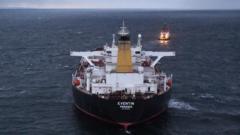In an escalating situation that underscores the ongoing geopolitical tensions surrounding the Ukraine conflict, Germany's maritime authorities confirmed that an oil tanker debilitated in the Baltic Sea belongs to what is referred to as Russia's "shadow fleet." The Panamanian-flagged vessel, named Eventin, apparently lost power and steering while carrying a substantial quantity of oil, prompting immediate action from German authorities.
Germany's Maritime Authorities Confront 'Shadow Fleet' Incident in Baltic Sea

Germany's Maritime Authorities Confront 'Shadow Fleet' Incident in Baltic Sea
Amid rising tensions, Germany's handling of a stranded Russian oil tanker highlights the ongoing challenges posed by Russia's shadow fleet operating under the radar of international sanctions.
German Foreign Minister Annalena Baerbock placed the blame squarely on Moscow, claiming that Russian President Vladimir Putin is attempting to circumvent sanctions and jeopardize European security by deploying a fleet of aging oil tankers. While Russia has remained largely silent on such allegations in the past, the incident has not drawn a public response from the Kremlin thus far.
The U.S., U.K., and E.U. have previously imposed stringent sanctions against Russia’s oil sector following its invasion of Ukraine in 2022, aiming to limit the Kremlin's capabilities. The Eventin vessel, measuring 274 meters long and carrying approximately 99,000 tonnes of oil, was reported to be drifting at slow speeds in coastal waters north of Rügen Island, posing environmental risks despite no immediate signs of oil leaks.
As part of the rescue operations, a specialized team was deployed via helicopter to establish towing connections for the struggling tanker, which was subsequently secured by three tugboats. The German authorities have been closely monitoring the situation and have reportedly taken precautionary safety measures due to rough sea conditions, as the region was experiencing significant wave activity.
Baerbock's statements echoed previous concerns about Russia's operations in the Baltic Sea, which include not only oil exports but also other activities that pose threats to maritime safety and security. The E.U. has been proactive in addressing the challenges posed by the shadow fleet, considering further sanctions against aging vessels that operate undercover to fund Russia's military campaign in Ukraine.
This latest incident contributes to the growing scrutiny of Russia's shadow fleet, frequently called the "dark fleet" due to its dubious operational practices, including unclear ownership and irregular flag registrations. In light of these developments, international efforts to sanction companies like Gazprom Neft and Surgutneftegas are intensifying, aiming to drain funding from Russia's war efforts.
The ramifications of the Eventin incident extend beyond maritime safety, raising concerns about environmental implications as well as geopolitical security in a region quick to respond to Russian provocations. With ongoing developments, both European and American officials have been vocal about the necessity of countering Russian oil exports amidst the conflict.
The U.S., U.K., and E.U. have previously imposed stringent sanctions against Russia’s oil sector following its invasion of Ukraine in 2022, aiming to limit the Kremlin's capabilities. The Eventin vessel, measuring 274 meters long and carrying approximately 99,000 tonnes of oil, was reported to be drifting at slow speeds in coastal waters north of Rügen Island, posing environmental risks despite no immediate signs of oil leaks.
As part of the rescue operations, a specialized team was deployed via helicopter to establish towing connections for the struggling tanker, which was subsequently secured by three tugboats. The German authorities have been closely monitoring the situation and have reportedly taken precautionary safety measures due to rough sea conditions, as the region was experiencing significant wave activity.
Baerbock's statements echoed previous concerns about Russia's operations in the Baltic Sea, which include not only oil exports but also other activities that pose threats to maritime safety and security. The E.U. has been proactive in addressing the challenges posed by the shadow fleet, considering further sanctions against aging vessels that operate undercover to fund Russia's military campaign in Ukraine.
This latest incident contributes to the growing scrutiny of Russia's shadow fleet, frequently called the "dark fleet" due to its dubious operational practices, including unclear ownership and irregular flag registrations. In light of these developments, international efforts to sanction companies like Gazprom Neft and Surgutneftegas are intensifying, aiming to drain funding from Russia's war efforts.
The ramifications of the Eventin incident extend beyond maritime safety, raising concerns about environmental implications as well as geopolitical security in a region quick to respond to Russian provocations. With ongoing developments, both European and American officials have been vocal about the necessity of countering Russian oil exports amidst the conflict.



















